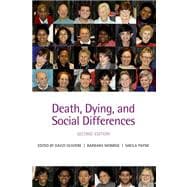
Note: Supplemental materials are not guaranteed with Rental or Used book purchases.
Purchase Benefits
What is included with this book?
| Foreword | p. v |
| List of Contributors | p. ix |
| Introduction: Social differences-the challenge for palliative care | p. 3 |
| The emergence of new forms of dying in contemporary societies | p. 8 |
| Social inequality in dying | p. 19 |
| Place and space: Geographic perspectives on death and dying | p. 32 |
| Communication, information, and support | p. 45 |
| Poverty and finance | p. 57 |
| Embracing diversity at the end of life | p. 70 |
| Disability and the death and dying agenda | p. 85 |
| Death and dying in older people | p. 101 |
| Vulnerable adults and families | p. 110 |
| Dying as a teenager or young person | p. 118 |
| People with intellectual disabilities | p. 126 |
| People with mental health needs | p. 134 |
| People with dementia | p. 144 |
| Homeless people | p. 151 |
| Travellers' and gypsies' death and dying | p. 159 |
| Asylum seekers and refugees | p. 166 |
| Palliative care for substance misusers | p. 173 |
| Family carers and social difference | p. 183 |
| Sexual orientation | p. 191 |
| Palliative care for prisoners | p. 200 |
| Bereavement-a world of difference | p. 207 |
| Afterword | p. 215 |
| Index | p. 217 |
| Table of Contents provided by Ingram. All Rights Reserved. |
The New copy of this book will include any supplemental materials advertised. Please check the title of the book to determine if it should include any access cards, study guides, lab manuals, CDs, etc.
The Used, Rental and eBook copies of this book are not guaranteed to include any supplemental materials. Typically, only the book itself is included. This is true even if the title states it includes any access cards, study guides, lab manuals, CDs, etc.